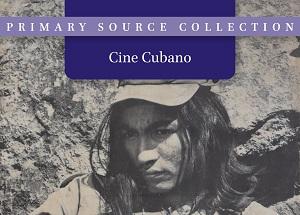Latin American Studies

Cine Cubano: Latin America’s Oldest Film Magazine
In June 1960, less than nineteen months after the establishment of Cuba's revolutionary government, the first issue of Cine Cubano was published. Despite the turbulent times, it had a print-run of 20,000 copies and was launched as a monthly. The cover featured a photograph of ‘Rebeldes,’ the second episode of the movie Historias de la Revolución, which at the time was yet to be released. The new journal would become the longest ongoing film magazine of Latin America and continues to be published until today.
Subject: Latin American Studies
Start: 1960
End: 2019
Place: Cuba

Classic Brazilian Cinema Online
Editor: Carl J. Mora
A unique collection of digitized historical film magazines from the 1910s to the 1960s, providing students and researchers with easy access to rare an previously dispersed sources documenting the cinematographic history of the biggest country in Latin America, Brazil.
Subject: Latin American Studies
Start: 1943
End: 1958
Place: Brasil

Classic Mexican Cinema Online, 1902–1965
Editor: Carl J. Mora
Mexican cinema, from its beginnings in the late 1890s to its Golden Age (1930s to 1960), was consistently the largest and most important of all the Spanish-speaking countries.
Subject: Latin American Studies
Start: 1943
End: 1958
Place: Mexico

Cuban Culture and Cultural Relations, 1959-, Part 1: “Casa y Cultura”
Editor: Project advisor: Arien González Crespo, Director,
Primary-source collection of ca. 45,000 fully-searchable documents from the Casa de las Américas in Havana, documenting the culture and cultural relations of Revolutionary Cuba and countries in Latin America and the Caribbean.
Subject: Latin American Studies
Start: 1959
Place: Cuba

Cuban Culture and Cultural Relations, 1959-, Part 2: Writers
Editor: Project advisor: Arien González Crespo, Director
This primary-source collection documents the literary, intellectual and cultural milieu of Revolutionary Cuba. Sourced from the archives of the Casa de las Américas in Havana, it provides unprecedented access to files covering more than a thousand writers, thinkers and artists from Cuba and abroad.
Subject: Latin American Studies
Start: 1959
Place: Cuba

Cuban Culture and Cultural Relations, 1959-, Part 3: Theater
Editor: Project advisor: Arien González Crespo, Director
Online collection of archival documents from the Casa de las Américas in Havana on the topic of Latin American and Caribbean theater and Cuban theater in particular.
Subject: Latin American Studies
Start: 1959
Place: Cuba

Cuban Culture and Cultural Relations, 1959-, Part 4: Music
Music in Latin America is a universe of sound that reflects the region's rich cultural heritage. From the contagious rhythms of samba to the passionate melodies of bolero, Latin American music is the result of the intense process of transculturation developed over more than four centuries between the native populations and the diverse cultures brought from Europe, Africa and Asia. Each country in the hemisphere has shaped its own musical culture, bringing to the international scene such significant genres as Argentine tango, Colombian cumbia, Brazilian bossa nova, and Cuban son. These, as well as numerous other music and dance genres and expressions, are an effective means of celebrating and preserving the cultural identity of Latin American communities. Likewise, music is a space for recording the historical memory of peoples who have been able to turn song into a weapon of struggle, a cry of protest, or a call for unity and solidarity in the defense of their rights.
Subject: Latin American Studies
Start: 1960
End: 2019
Place: Cuba

Cuban Periodicals: Cultural Magazines Published by Casa de las Américas, 1960–2009
Editor: Luisa Campuzano Sentí
Cuban Periodicals: Cultural Magazines Published by Casa de las Américas, 1960–2009
Subject: Latin American Studies
Place: Cuba

Cuban Pre-Revolutionary Cinema
Editor: Luciano Castillo Rodríguez
Cuban Pre-Revolutionary Cinema
Subject: Latin American Studies
Place: Cuba

History of Religiosity in Latin America Online, c. 1830–1970
Until now it has been impossible to develop the study of religion in modern Latin America. The imprints of the nineteenth and twentieth centuries that reflect local devotions and syncretist rituals, religious iconography and poetry, and the pastoral campaigns of the various churches and sects, went uncollected and unnoticed until the early 1960s, when Ivan Illich began to search for them and to collect them in the CIDOC Library of Cuernavaca, Mexico. The filming of a selection of material from this collection has been done in many libraries throughout Mexico, Venezuela, Brazil, Argentina and Chile.
Subject: Latin American Studies
Start: 1897
End: 1972
Place: Peru

Latin American Anarchist and Labour Periodicals Online
Editor: Max Nettlau e.a.
This collection contains the periodicals that have been accumulated by the Austrian anarchist, historian and collector Max Nettlau (1865-1944), together with a number of later additions, held at the International Institute of Social History (IISH) in Amsterdam. The collection provides a richness of documentation pertaining explicitly to the formative anarchist and anarcho-syndicalist episode (1890-1920) in the history of Latin American labor movements.
Subject: Latin American Studies
Start: 1880
End: 1940

Revolución y Cultura, 1967–2009
Editor: Project advisor: Luisa Campuzano Sentí
Electronic edition of the Cuban magazine Revolución y Cultura, spanning the years 1967–2009.
Subject: Latin American Studies
Start: 1967
End: 2009
Place: Cuba

The Guatemala Collection
Spanning more than four hundred years, The Guatemala Collection: Government and Church Documents for Sacatepéquez (1587-1991) concentrates primarily on the national era, particularly 1824-1948. The vast majority of the documents—correspondence, annual reports, statistics, letters, litigation—found within The Guatemala Collection are copies from the Archivo General de Centroamérica and the Archivo Histórico Arquidiocesano “Francisco de Paula García Peláez” (formerly known as Archivo Eclesiástico de Guatemala) in Guatemala City. In recent years, the latter has seldom been opened to the public. Colonial documents mainly come from the Archivo General de Indias in Seville, Spain. A few of the documents and transcripts come from the Centro de Investigaciones Regionales de Mesoamérica (CIRMA) in Antigua. In general, the documents are organized by place, theme, and chronology.
Subject: Latin American Studies
Start: 1587
End: 1991
Place: Guatemala